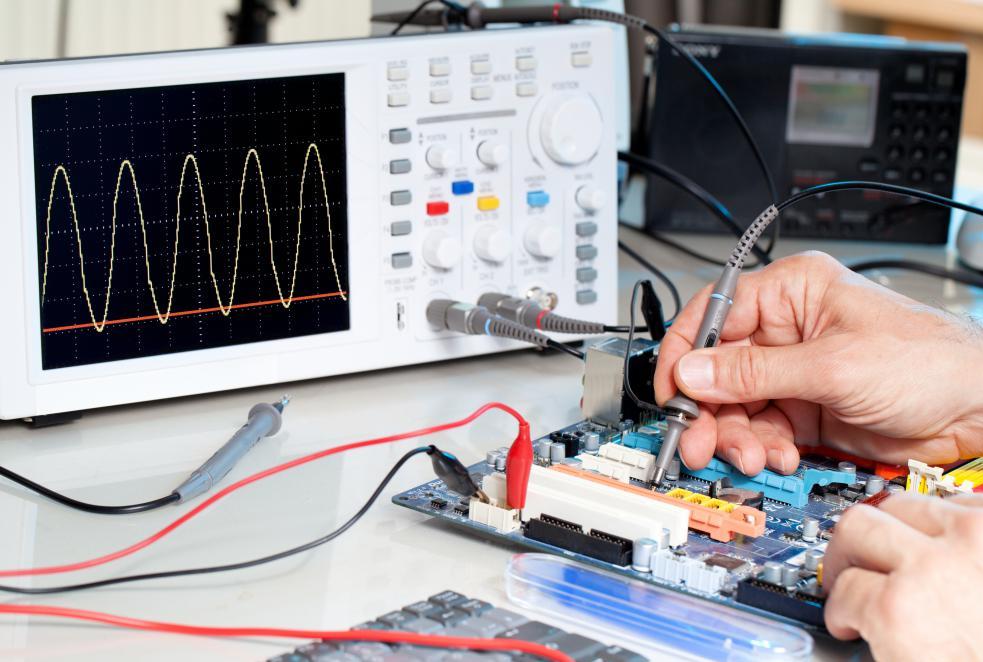Electronics & Communication Engineering
To impart value based technical education and train students to turn out full- fledged engineers in the field of Electronics & Communication Engineering with an overall background suitable for making a successful career either in Industry/Research or higher education i.e, from A.Y 2008-09 with an intake of 60 students. Presently, the intake of the ECE Department is 180 students. The department has faculty strength of 42 well qualified, experienced and dedicated Post graduates with four Doctorates and some of them are pursuing Ph.D in different streams.
ECE Department has always been on a high growth path with strong committed faculty towards engineering education, who work with zeal and enthusiasm. The Department motive is to provide a vibrant and optimum learning environment to the students in order to help them excel in today's competition globally. To keep in pace with the current technological trends, the department has established few centre of excellences to incorporate all advancements in collaboration with industries. This gives the students a hostile and pragmatic view of the present scenario of Electronics and Communication industry. The department encourages students into postgraduate studies and prepares them for leadership roles in research and development. Along with UG one M.Tech course in Digital Electronics and Communication Systems from A.Y 2014-15 with an intake of 18 students is also offered.
The ECE department has good infrastructure with 8 different labs namely Microwave Engineering lab, Microprocessor Lab, Digital ICs Lab, Communications Lab, Computer Lab, EDC Lab, LIC Lab, DSP & VLSI Lab. All the labs are fully equipped to cater the present day advanced technology. Computer lab is fully air conditioned with necessary systems and softwares. The department consists of 10 well-furnished classrooms with e-class room facility and two staff rooms, HOD's room, professor cabins and department library comprising of different textbooks, magazines and competitive exam preparation books.
The Department has student's chapters like IETE Student Forum and ISTE Student Forum conducts many technical talks, seminars, quiz etc. Every semester at least two guest lectures are being arranged in addition to above activities. Our students participating in national and state level technical competitions and there by winning many prizes showing their hidden talents. Very recently IEEE student chapter has been started; Students are encouraged to participate in State and National level technical contests. National level technical events are being held in the Department during 2st week of September every year on behalf of engineer's day. Every year our final year students are encouraged to write GATE, CAT, GRE, TOEFL & IELTS exams. Our students got all India GATE ranks every year.
ECE department has two center of excellences Assistive Technology Lab (ATL) and National Instruments lab (NI). Assistive Technology Lab (ATL) is a vision of our chairman Mr. K.V.Vishnu Raju, to serve the differently able people by donating electronic gadgets. ATL was established in the year 2012 in collaboration with UMass, Lowell, USA. National Instruments lab was established in 2017 to train the students on Lab View which provides internships and project and is a certification course.
Salient Features
Vision, Mission, PEO's & PO's
Vision of the ECE Department
In pursuit of world class excellence in the field of Electronics and Communication Engineering by empowering quality education and research.
Mission of the ECE Department
Program Educational Objectives - PEO's
Program Outcomes - PO's
Program Specific Outcomes - PSO's
Research

The department of Electronics and Communication Engineering of Vishnu Institute of Technology is committed to basic and applied research in frontier areas constituted into several research groups like Communication Systems (Mobile Ad Hoc Networks; Optical Communication & Optical Networks; Wireless Communications) ; Signal Processing (Image processing, signal processing); Microwave and Antenna; VLSI and Embedded Systems. In addition, faculty and students conduct research projects in areas of assistive technology and also collaborates with National Instrument systems. Our department has well - equipped laboratories, centre of excellence's, high speed internet, campus connected network that promotes research activities. The faculty of our department has authored one book, 3 SPRINGER Book chapters, published papers in IEEE, and Scopus indexed journals (Elsevier, Inderscience, Springer).
Electronics & Communication Engineering
Electronics & Communication has penetrated every walk of today's lifestyle from home appliances to mobile phones, from computers to security devices (CCTVs etc), from biometric attendance to remote controlled doors and so on. The world today cannot be imagined without electronics in it, thanks to Electronics & Communication Engineers. Electronics & Communication Engineering takes place on all levels: in the public sector from municipal through to national governments, and in the private sector from individuals through to international companies.

